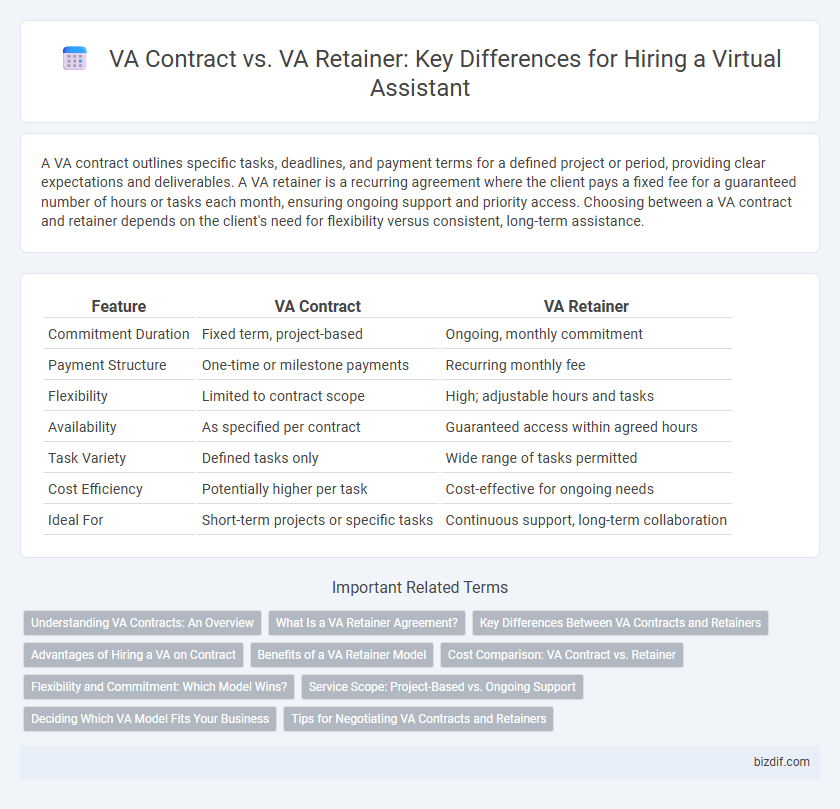A VA contract outlines specific tasks, deadlines, and payment terms for a defined project or period, providing clear expectations and deliverables. A VA retainer is a recurring agreement where the client pays a fixed fee for a guaranteed number of hours or tasks each month, ensuring ongoing support and priority access. Choosing between a VA contract and retainer depends on the client's need for flexibility versus consistent, long-term assistance.
Table of Comparison
| Feature | VA Contract | VA Retainer |
|---|---|---|
| Commitment Duration | Fixed term, project-based | Ongoing, monthly commitment |
| Payment Structure | One-time or milestone payments | Recurring monthly fee |
| Flexibility | Limited to contract scope | High; adjustable hours and tasks |
| Availability | As specified per contract | Guaranteed access within agreed hours |
| Task Variety | Defined tasks only | Wide range of tasks permitted |
| Cost Efficiency | Potentially higher per task | Cost-effective for ongoing needs |
| Ideal For | Short-term projects or specific tasks | Continuous support, long-term collaboration |
Understanding VA Contracts: An Overview
A VA contract outlines specific duties, deliverables, and timelines, serving as a formal agreement between a virtual assistant and client to ensure clear expectations and legal protection. VA retainers typically involve a pre-paid fee for a set number of hours or services, offering ongoing support with flexible task management. Understanding the distinctions helps businesses choose the right engagement model for consistent productivity and cost efficiency.
What Is a VA Retainer Agreement?
A VA retainer agreement is a contract where a client pays a virtual assistant a fixed monthly fee to secure a set number of service hours or priority access. This arrangement guarantees availability and consistent support, allowing better planning and resource allocation for both parties. Unlike pay-as-you-go contracts, retainer agreements provide stability and ongoing collaboration.
Key Differences Between VA Contracts and Retainers
VA contracts typically outline specific project deliverables, timelines, and payment terms with a clear start and end date, providing structure for one-time or short-term tasks. VA retainers establish an ongoing relationship where clients pay a fixed monthly fee for a guaranteed number of hours or services, ensuring priority access and consistent support. The key difference lies in flexibility and commitment: contracts offer project-based engagement, whereas retainers promote continuous collaboration and availability.
Advantages of Hiring a VA on Contract
Hiring a virtual assistant (VA) on contract offers flexibility by enabling businesses to pay only for specific projects or hours worked, reducing long-term financial commitment. Contractual agreements clearly outline deliverables, timelines, and performance metrics, ensuring accountability and measurable results. This arrangement allows companies to quickly scale their workforce based on immediate needs without the overhead costs associated with retainers or full-time employees.
Benefits of a VA Retainer Model
A VA retainer model guarantees consistent access to a virtual assistant's time and expertise, providing reliability and prioritization often lacking in contract-based arrangements. This approach ensures ongoing support tailored to fluctuating business needs, enhancing productivity and efficient task management. Retainers foster a long-term partnership, resulting in deeper understanding of business processes and improved quality of assistance.
Cost Comparison: VA Contract vs. Retainer
A VA contract typically charges based on the number of hours or specific tasks completed, allowing for flexible spending but potentially higher costs during busy periods. A VA retainer involves a fixed monthly fee for a set number of hours, offering predictable expenses and often better value for consistent workloads. Comparing costs, retainers generally provide savings for ongoing support, while contracts suit sporadic or short-term needs.
Flexibility and Commitment: Which Model Wins?
A VA contract offers defined terms and deliverables with less flexibility, ideal for specific projects requiring clear timelines and outcomes. VA retainers provide ongoing support with adaptable hours and tasks, allowing businesses to scale assistance based on evolving needs. For companies prioritizing flexibility and long-term commitment, retainers often deliver a more dynamic and responsive virtual assistant arrangement.
Service Scope: Project-Based vs. Ongoing Support
A VA contract typically defines a project-based service scope, outlining specific tasks and deliverables with clear start and end dates. In contrast, a VA retainer establishes an ongoing support arrangement, allowing clients to access a set number of hours or services each month. This continuous commitment enables more flexible and evolving assistance tailored to dynamic business needs.
Deciding Which VA Model Fits Your Business
Choosing between a VA contract and a VA retainer depends on your business's workload consistency and budget flexibility. A VA contract suits project-based tasks with clear deadlines, offering control over specific deliverables, while a VA retainer provides ongoing support for continuous, evolving needs. Evaluating your operational demands and financial planning ensures selecting the VA model that enhances productivity and cost efficiency.
Tips for Negotiating VA Contracts and Retainers
When negotiating VA contracts and retainers, clearly define the scope of work, deliverables, and payment terms to avoid misunderstandings. Establish mutually beneficial deadlines and flexibility clauses to accommodate changing needs and priorities. Ensure confidentiality and termination conditions are explicitly stated to protect both parties' interests.
VA contract vs VA retainer Infographic

 bizdif.com
bizdif.com